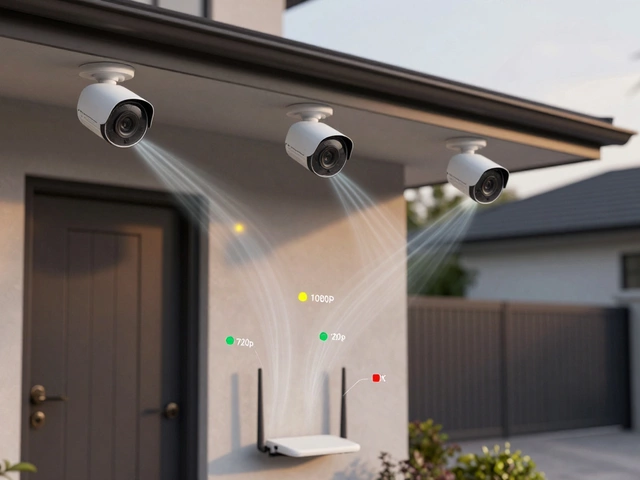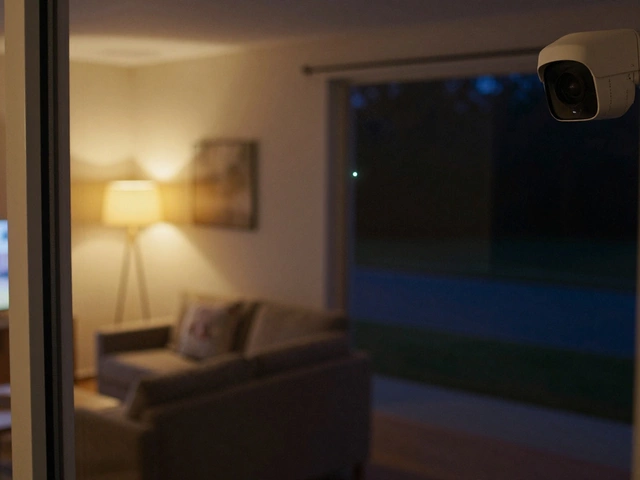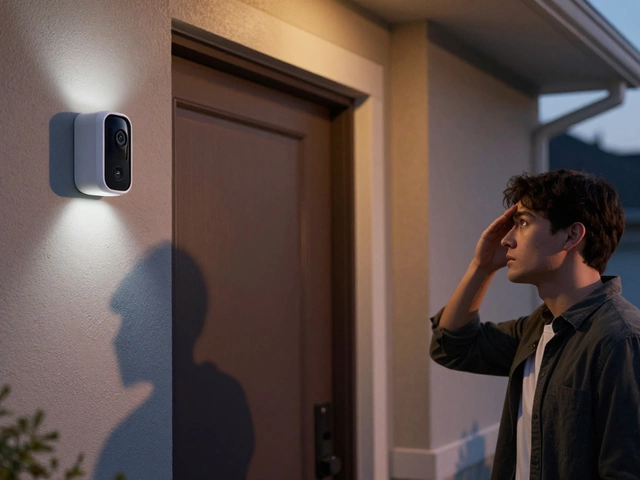Ever wondered what happens to your Ring alarm system when the Wi-Fi decides to go AWOL? You know, that 'great' moment when you're watching your favorite show, and suddenly, the internet drops. But unlike missing the last five minutes of some sitcom, when it comes to security, things can get a bit more crucial. Are you still safe? Does the system still work?
Let's get into it. Ring security systems primarily rely on Wi-Fi to send alerts and let you view footage remotely. But if your connection goes down, things can still hold together somewhat. Your Ring systems won’t be able to stream live footage or send notifications to your phone, but local alarms and certain sensors may continue to function. Your security isn't entirely out the window!
But there's more to know to make sure your security isn't left hanging in the wind when the Wi-Fi hiccups. If you've got a cellular backup, that could keep the system ticking even when your primary internet connection fails. And here’s a pro tip: make sure this feature's active and ready to jump in as and when needed.
- Ring and Wi-Fi Dependency
- Alternatives During Wi-Fi Outages
- Tips for Uninterrupted Security
- Looking at the Bigger Picture
Ring and Wi-Fi Dependency
Alright, let's break down how your Ring system gets along with Wi-Fi. The thing is, a lot of the Ring’s features thrive on a robust internet connection. It’s like asking if you can stream Netflix without Wi-Fi—spoiler alert: you can’t.
The main gig of your Ring device is its ability to connect to your home’s Wi-Fi. This connection is what lets you receive push notifications on your phone, access live feeds, and store video recordings on the cloud. Pretty neat, right? But there's the catch—take away the Wi-Fi, and you're left without these real-time features.
Wi-Fi lets your Ring send data to your phone through the app, enabling you to watch live video or listen through the device if you have a compatible plan. This is what most folks rely on when they're checking their home while away. But when your Wi-Fi skips town, the Ring can't connect to the app, meaning live streams and remote communication with folks at your door are paused.
What Still Works Without Wi-Fi?
Here's the silver lining: key components of your system are still somewhat active. Features that are controlled locally like chimes and sirens via devices tethered to the main Ring may still function to a degree. So, your Ring won't go completely dark.
Moreover, if your system includes a built-in cellular backup and it's activated, it can step in to fill the gap when your Wi-Fi is down. It's like having a security safety net. Keep in mind, this usually depends on whether you've got a Protection Plan that supports it.
Here's the deal if you're eyeballing the potential downside: no Wi-Fi means no video uploads to the cloud, limited stored offline capabilities, and definitely no motion alerts on your phone unless cellular backup kicks in. But who's excited about exploring other ways we can keep things running smoothly? Read on!
Alternatives During Wi-Fi Outages
Losing Wi-Fi shouldn't mean losing security. Many folks using Ring might worry about what happens when their internet decides to take a break. But don't stress too much; there are alternatives to keep your security game strong.
Cellular Backup: Your Security Lifeline
If your Wi-Fi goes down, a cellular backup can swoop in to save the day. Most modern wireless alarm systems offer this feature, kicking in when your main connection checks out. Think of it like having a backup generator during a power cut. Just make sure that your cellular plan is active and linked to the control panel.
Local Storage: Keeping Your Data Safe
Some systems allow for local storage, storing video footage and alerts locally when the internet is unavailable. Check your device settings to see if that’s an option. This means you won't lose any evidence just because the Wi-Fi's down.
Using a Range Extender
If spotty Wi-Fi is becoming a regular guest at your place, consider adding a Wi-Fi range extender to your setup. It can help boost the signal strength, reducing dropouts and keeping your Ring system connected more consistently. They're quite handy and easy to set up:
- Pick a location between your router and Ring device.
- Plug in the extender and connect it to your network.
- Reap the benefits of a stronger, more stable connection.
Investing in Dual-Band Routers
If you haven't already, think about investing in a dual-band router. These routers support both 2.4GHz and 5GHz bands, providing better coverage and less interference. These are particularly useful in homes with multiple devices vying for bandwidth.
With these alternatives in your arsenal, a little Wi-Fi blip won't make your home vulnerable. Staying proactive and having backup methods ensures your security isn't reliant on just one connection. Because keeping your home safe shouldn't hinge on an internet gremlin.

Tips for Uninterrupted Security
So, you're worried about your Ring security system taking a nap when the Wi-Fi goes down, huh? Let's go through some practical steps to keep your security up, no matter what your internet connection is doing.
Invest in Cellular Backup
First off, think about adding a cellular backup. Many wireless alarm systems, including Ring, offer this feature. It’s like having a security sidekick that steps up when the main Wi-Fi part of your system flickers out. Make sure it's set up and active. It might cost you a bit more, but the peace of mind could be worth it.
Get a Router with Battery Backup
If your router goes down because of a power outage, your Wi-Fi is toast no matter how good the connection is normally. Consider getting a router with a battery backup. It'll keep your network alive through short power outages, preventing unnecessary security drop-outs.
Keep Your App Updated
Keeping your Ring app updated might sound like a no-brainer, but it's crucial. App updates could include important patches that improve how your system handles connectivity issues. A quick tap to update could mean the difference between a smooth alert and a silent glitch.
Regular System Checks
Nobody loves regular maintenance checks, but they’re vital. Set a reminder to check your system's connectivity and battery status routinely. This way, you won’t be caught off guard if something's amiss right when you need your system the most.
| Tip | Effect |
|---|---|
| Enable Cellular Backup | Provides connection during Wi-Fi outages |
| Router with Battery Backup | Keeps network running during a power cut |
| Update App Regularly | Improves performance and bug fixes |
| System Checks | Ensures everything works as it should |
By following these tips, you could really beef up your home's security system, ensuring that your wireless alarm system perks right back up even if the Wi-Fi starts acting up. Peace of mind is worth the effort, right?
Looking at the Bigger Picture
When it comes to securing your home with a Ring system, thinking beyond the box is key. Sure, relying on Wi-Fi is all well and good when it's working smoothly, but in the real world, connections can be as unpredictable as the weather. So, what's the ultimate strategy?
Unified Security Systems
First off, it might be worthwhile to consider a unified security setup. Many modern systems don't just rely on wireless alerts or footage streaming but incorporate a range of features. For instance, integrating a cellular backup is often a life-saver.
A respected source in the industry, John Davis, a leading security analyst, puts it this way:
"An integrated system that combines both Wi-Fi and cellular capabilities offers the best security blanket. You're not leaving anything to chance, even when the unexpected hits."
Local Storage Options
When Wi-Fi is toast, that doesn't mean you're in the dark. Consider using devices that support local storage. This way, even if your internet takes a coffee break, you're still collecting crucial security footage on-site. You could later review or share the recordings when your connection is stable again.
- Local storage ensures evidence isn't lost during outages.
- It provides autonomy over your data since footage isn't sitting on a cloud server.
Cost vs. Benefit
You might wonder if the added expenses of cellular backup or additional storage are worth it. But think about this: what's the cost of peace of mind? While no system isn't entirely foolproof, an extra layer or two of security helps cover more bases. A slight dip into the wallet could mean a smoother sail through Wi-Fi outages.
Looking Ahead
The future of home security is leaning more towards hybrid systems that leverage both Wi-Fi and other fallback options. As tech advances, look for systems that offer more than basic functionality so you're covered no matter what's up with the internet.
| Feature | Benefit |
|---|---|
| Cellular Backup | Keeps system active even without Wi-Fi |
| Local Storage | Maintains video records during internet outages |
In the end, treating home security like a layered system rather than a single element proposition can be a real game changer. And it's these little adjustments and considerations that make all the difference.




